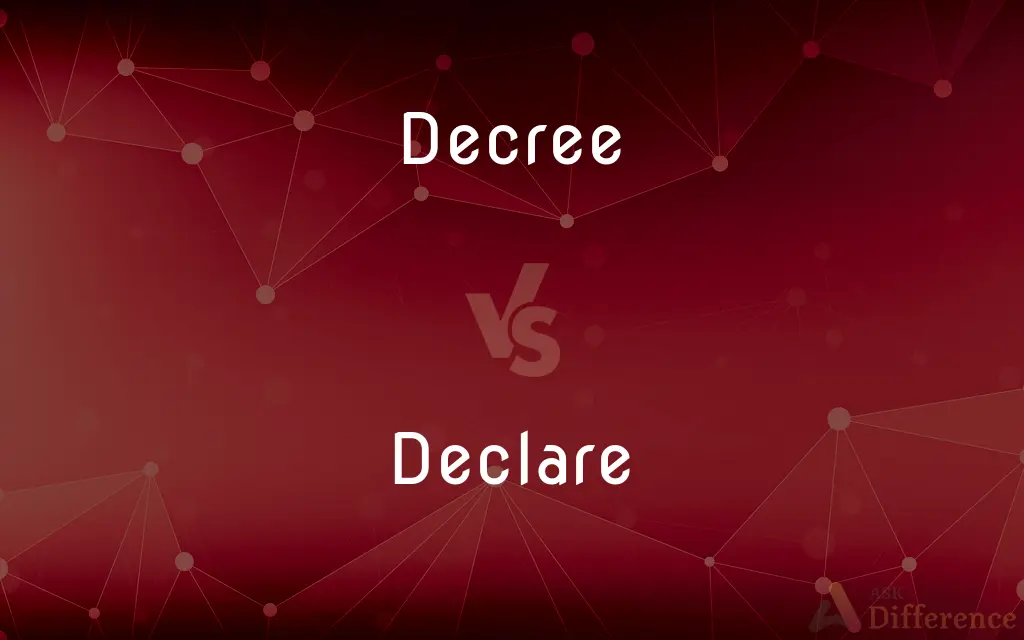Decree vs. Declare — What's the Difference?
By Urooj Arif & Maham Liaqat — Updated on February 23, 2024
A decree is an official order issued by a legal authority, often having the force of law, while to declare means to announce or proclaim something clearly and emphatically.

Difference Between Decree and Declare
Table of Contents
ADVERTISEMENT
Key Differences
A decree typically comes from a governmental or legal authority, serving as a formal and binding decision, often related to legal judgments or administrative orders. It carries the weight of law, mandating compliance from those it affects. For instance, a court might issue a decree finalizing a divorce, or a government might issue a decree imposing new regulations.
To declare involves making a statement or announcement about a particular state of affairs, opinion, or intention. Declarations can be made by individuals or authorities, and while they can be significant and impactful, they do not inherently possess legal force unless backed by an authority that imbues them with such power. For example, a government declaring a state of emergency is an authoritative act, whereas an individual declaring their intentions has a personal significance.
Decrees are formal and often entail a process for issuance, requiring adherence to specific legal or procedural frameworks. They are instrumental in law enforcement, regulatory actions, and administrative matters, ensuring structured governance and societal order. Declarations, while they can be formal, often have a broader and more varied application, encompassing personal statements, policy announcements, or expressions of belief.
The issuance of a decree usually follows a deliberative process, involving legal reasoning, consultation, and sometimes, public input, reflecting its authoritative and binding nature. Declarations can be more immediate, reflecting a decision, stance, or acknowledgment, and can be as simple as verbal announcements or as formal as written statements.
The main distinction lies in their nature and effect: decrees are binding orders with legal force, while declarations are announcements that may or may not carry legal weight depending on the context and the authority behind them.
ADVERTISEMENT
Comparison Chart
Nature
Official order with legal force
Announcement or proclamation
Issued by
Legal or governmental authorities
Individuals or authorities
Legal Force
Yes, binding and enforceable
Not inherently, unless backed by authority
Process
Formal issuance, often after deliberation
Can be immediate, varying levels of formality
Application
Legal judgments, regulatory actions
Statements of intent, policy announcements
Compare with Definitions
Decree
An official order issued by a legal authority.
The court's decree ended the long-standing dispute.
Declare
To announce or proclaim something openly.
The leader declared victory after the election results were in.
Decree
A binding decision with legal force.
The government's decree on environmental regulations goes into effect immediately.
Declare
To announce officially or authoritatively.
The government declared a state of emergency following the natural disaster.
Decree
A conclusive judgment in legal proceedings.
The divorce decree was finalized last week.
Declare
To make a formal statement or announcement.
The company declared its commitment to sustainability.
Decree
An administrative order affecting public policy.
The mayor's decree mandated water rationing during the drought.
Declare
To reveal one's intentions or opinions.
She declared her intention to run for office.
Decree
A formal pronouncement related to law.
The royal decree established a new national holiday.
Declare
To assert something confidently.
He declared his innocence in the face of accusations.
Decree
A decree is a rule of law usually issued by a head of state (such as the president of a republic or a monarch), according to certain procedures (usually established in a constitution). It has the force of law.
Declare
To make a declaration.
Decree
An administrative act applying or interpreting articles of canon law.
Declare
To make clear, explain, interpret.
Decree
A doctrinal or disciplinary act of an ecclesiastical authority.
Declare
To make a declaration, or an open and explicit avowal; to proclaim one's self; - often with for or against; as, victory declares against the allies.
Like fawning courtiers, for success they wait,And then come smiling, and declare for fate.
Decree
An edict or law.
Declare
To state the plaintiff's cause of action at law in a legal form; as, the plaintiff declares in trespass.
Decree
An order from one having authority, deciding what is to be done by a subordinate; also, a determination by one having power, deciding what is to be done or to take place; edict, law; authoritative ru decision.
There went out a decree from Cæsar Augustus that all the world should be taxed.
Poor hand, why quiverest thou at this decree?
Declare
Make a declaration (of dutiable goods) to a customs official;
Do you have anything to declare?
Decree
A decision, order, or sentence, given in a cause by a court of equity or admiralty.
Decree
A legally binding command or decision entered on the court record (as if issued by a court or judge);
A friend in New Mexico said that the order caused no trouble out there
Common Curiosities
Can anyone issue a decree?
No, decrees are issued by individuals or bodies with legal or governmental authority.
How is a decree enforced?
Through the legal system or by the authority that issued it, depending on its nature.
Can a decree be challenged or appealed?
Yes, depending on its context and the legal system in place, decrees can often be appealed in court.
Who can declare war?
Typically, the power to declare war is vested in the government or sovereign of a nation.
Is a declaration legally binding?
Not inherently; its legal weight depends on the context and authority behind it.
Can a declaration affect legal status?
Yes, if made by an authorized entity, such as a government declaring a state of emergency.
What's the difference between a decree and a law?
A decree is a specific order or decision issued by an authority, while a law is a general rule passed by a legislative body.
Can declarations change public policy?
Yes, especially when made by those in authority, declarations can signal shifts in public policy.
Are decrees public record?
Generally, yes, especially if they are issued by courts or governmental bodies, they are part of the public record.
What is a decree nisi?
It is a provisional decree, especially in divorce cases, that becomes absolute after a certain period unless successfully challenged.
What is a declarative statement?
It is a statement that makes a declaration or announcement, often asserting a fact or intention.
How do declarations impact society?
They can influence public opinion, signal policy changes, or express collective intentions or values.
Can a person declare something on behalf of another?
Yes, if they are authorized to do so, such as a legal representative or spokesperson.
Why do governments issue declarations?
To inform the public, set policy direction, express intentions or commitments, or in response to specific events or situations.
What is the significance of a decree absolute?
It is a final and conclusive order by a court, such as in divorce proceedings, making the dissolution of marriage official.
Share Your Discovery

Previous Comparison
Snoop vs. Stoop
Next Comparison
Bovine vs. OvineAuthor Spotlight
Written by
Urooj ArifUrooj is a skilled content writer at Ask Difference, known for her exceptional ability to simplify complex topics into engaging and informative content. With a passion for research and a flair for clear, concise writing, she consistently delivers articles that resonate with our diverse audience.
Co-written by
Maham Liaqat













































